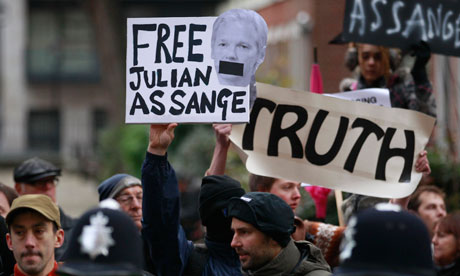
The decision to have Julian Assange sent to a London jail and kept there was taken by the British authorities and not by prosecutors in Sweden, as previously thought, the Guardian has learned.
The Crown Prosecution Service will go to the high court tomorrow to seek the reversal of a decision to free the WikiLeaks founder on bail, made yesterday by a judge at City of Westminster magistrates court.
It had been widely thought Sweden had made the decision to oppose bail, with the CPS acting merely as its representative. But today the Swedish prosecutor's office told the Guardian it had "not got a view at all on bail" and that Britain had made the decision to oppose bail.
Lawyers for Assange reacted to the news with shock and said CPS officials had told them this week it was Sweden which had asked them to ensure he was kept in prison.
Karin Rosander, director of communications for Sweden's prosecutor's office, told the Guardian: "The decision was made by the British prosecutor. I got it confirmed by the CPS this morning that the decision to appeal the granting of bail was entirely a matter for the CPS. The Swedish prosecutors are not entitled to make decisions within Britain. It is entirely up to the British authorities to handle it."
As a result, she said, Sweden will not be submitting any new evidence or arguments to the high court hearing tomorrow morning. "The Swedish authorities are not involved in these proceedings. We have not got a view at all on bail."
After the Swedish statement was put to the CPS, it confirmed that all decisions concerning the opposing of bail being granted to Assange had been taken by its lawyers. It said: "In all extradition cases, decisions on bail issues are always taken by the domestic prosecuting authority. It would not be practical for prosecutors in a foreign jurisdiction … to make such decisions."
Last week Sweden issued a warrant for Assange's arrest and extradition over sexual assault allegations. On 7 December the British prosecutor, Gemma Lindfield, convinced the senior district court judge Howard Riddle that Assange must be kept in custody because he was a flight risk.
Yesterday the judge accepted that Assange could be released on bail, but he was kept in Wandsworth prison after the CPS said it wanted to appeal against the decision to grant bail to a higher court.
The CPS's formal grounds of appeal for the hearing tomorrow morning, seen by the Guardian, will say that Assange must be kept in prison until a decision is made whether to extradite him, which could take months.
Read More:
http://www.guardian.co.uk/media/2010/dec/15/julian-assange-bail-decision-uk
The Crown Prosecution Service will go to the high court tomorrow to seek the reversal of a decision to free the WikiLeaks founder on bail, made yesterday by a judge at City of Westminster magistrates court.
It had been widely thought Sweden had made the decision to oppose bail, with the CPS acting merely as its representative. But today the Swedish prosecutor's office told the Guardian it had "not got a view at all on bail" and that Britain had made the decision to oppose bail.
Lawyers for Assange reacted to the news with shock and said CPS officials had told them this week it was Sweden which had asked them to ensure he was kept in prison.
Karin Rosander, director of communications for Sweden's prosecutor's office, told the Guardian: "The decision was made by the British prosecutor. I got it confirmed by the CPS this morning that the decision to appeal the granting of bail was entirely a matter for the CPS. The Swedish prosecutors are not entitled to make decisions within Britain. It is entirely up to the British authorities to handle it."
As a result, she said, Sweden will not be submitting any new evidence or arguments to the high court hearing tomorrow morning. "The Swedish authorities are not involved in these proceedings. We have not got a view at all on bail."
After the Swedish statement was put to the CPS, it confirmed that all decisions concerning the opposing of bail being granted to Assange had been taken by its lawyers. It said: "In all extradition cases, decisions on bail issues are always taken by the domestic prosecuting authority. It would not be practical for prosecutors in a foreign jurisdiction … to make such decisions."
Last week Sweden issued a warrant for Assange's arrest and extradition over sexual assault allegations. On 7 December the British prosecutor, Gemma Lindfield, convinced the senior district court judge Howard Riddle that Assange must be kept in custody because he was a flight risk.
Yesterday the judge accepted that Assange could be released on bail, but he was kept in Wandsworth prison after the CPS said it wanted to appeal against the decision to grant bail to a higher court.
The CPS's formal grounds of appeal for the hearing tomorrow morning, seen by the Guardian, will say that Assange must be kept in prison until a decision is made whether to extradite him, which could take months.
Read More:
http://www.guardian.co.uk/media/2010/dec/15/julian-assange-bail-decision-uk
No comments:
Post a Comment